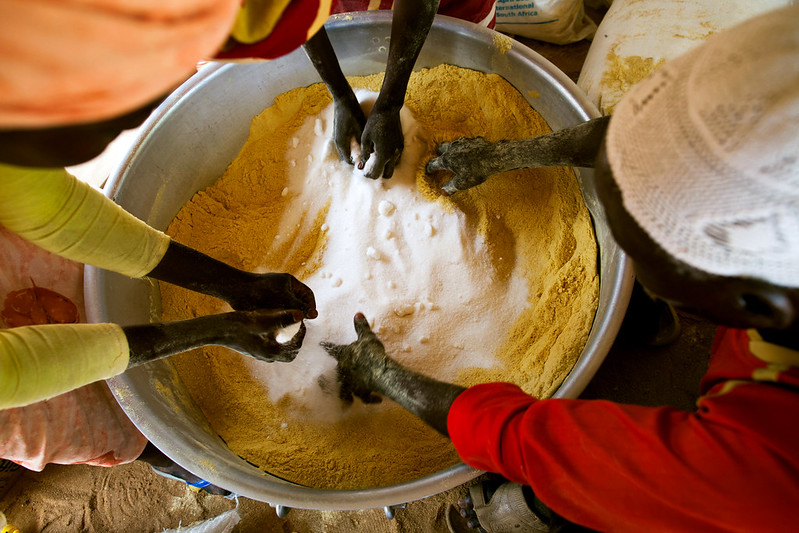16 October marks World Food Day, a global observance established by the United Nations Food and Agriculture Organization (FAO) in 1979. This day is dedicated to raising awareness of the critical issues surrounding hunger, malnutrition and the urgent need for equitable access to healthy diets. In a world where the global food system produces more than enough to feed everyone, it is a reality that millions of people continue to suffer from hunger. This year’s World Food Day reminds us that access to food is not just a necessity but a fundamental human right.
The persistent crisis of hunger
Despite the abundance of food produced globally, 733 million people still experience hunger due to weather shocks, armed conflicts, economic crises, and the ongoing fallout from the COVID-19 pandemic. These crises disproportionately affect the most vulnerable populations—many of whom are agricultural workers—underscoring the growing inequalities both across and within nations. Hunger continues to be one of the most urgent global challenges, but its solutions are intricately tied to broader issues like social justice, climate change, and economic resilience.
Food as a human right
The Universal Declaration of Human Rights enshrines the right to food as fundamental, alongside the rights to life, liberty, work, and education. Yet, too many people around the globe cannot access or afford nutritious food. Over 2.8 billion people cannot maintain a healthy diet, and in many countries, diets lack the diversity needed to ensure proper nutrition.
Undernutrition and obesity coexist in many parts of the world, affecting people across socio-economic classes. Unhealthy diets, often high in processed foods and low in fresh fruits and vegetables, are a leading cause of malnutrition in its many forms. It is a paradox of modern life that while some people are food-insecure, others suffer from the consequences of overconsumption or poor nutrition, often due to the convenience and affordability of unhealthy foods.
The global food challenge
FAO’s call for greater food diversity is central to improving global diets. This year’s World Food Day emphasises the importance of ensuring that diverse, nutritious, affordable, and safe foods are available in fields, markets, and on tables everywhere. From agricultural reforms to support small-scale farmers to investments in sustainable fishing practices, the world must embrace a more holistic approach to food production and distribution.
In too many places, vulnerable populations are forced to rely on low-cost, calorie-dense foods that lack essential nutrients, worsening health outcomes and perpetuating cycles of poverty. Ensuring everyone has access to healthy, affordable food is not just an issue of availability—it’s a matter of fairness, opportunity, and justice.
Our current agrifood systems are both victims and contributors to global crises. Agriculture is among the sectors most vulnerable to climate change, with extreme weather events such as droughts, floods, and storms devastating crops and livelihoods. At the same time, agricultural practices that rely heavily on chemical inputs and monocropping contribute to soil degradation, water pollution, and biodiversity loss, further undermining the stability of the planet’s ecosystems.
However, the same systems that are contributing to climate change also hold the potential to help combat it. By transforming agrifood systems—making them more sustainable, resilient, and inclusive—the world can mitigate environmental damage and create more peaceful, equitable, and enduring livelihoods for all.
A call to action
World Food Day is a reminder that the fight against hunger and malnutrition is far from over. It is a day to reflect on the importance of food security and a call to action for governments, organisations, and individuals to take concrete steps to ensure everyone has access to a healthy and nutritious diet.
We can all play a role in transforming food systems. Supporting local farmers, reducing food waste, advocating for sustainable practices, and promoting policies that address inequality in food distribution are just a few ways to contribute.
Ultimately, achieving food security for all requires global cooperation, innovation, and a commitment to justice.
Food is also a right, a necessity, and a pathway to a healthier, more equitable world. As we mark this year’s World Food Day, let us renew the commitment to ensure that no one is left behind in the fight against hunger.
SIANI celebrates it
To commemorate World Food Day, the Swedish FAO Committee is supporting an event, on 18 October, to celebrate the Swedish World Food day, ”Right to foods for a better life and a better future” focused on school meals, highlighting the essential role of nutritious school meals in combating hunger, promoting education and health. Additionally, on 16 October, in celebration of Swedish World Hunger Day 2024, SIANI is collaborating with Reformaten and The Hunger Project for the launch of the ”Matskiftet – 12 idéer” (The Food Shift – 12 ideas), 12 inspiring examples of innovative food solutions aimed at inspiring positive global change within the food system.
Moreover, on October 12, SIANI will release the first leaflet in a series on Agroecology Principles and Practices during the Harvest Fest at Alnarp’s Agroecology Farm. This series will highlight practical applications of agroecological principles in farming, designed to inspire the widespread adoption of agroecological practices. Finally, SIANI will host a hybrid side event at the 2024 World Food Forum Flagship event in Rome on 18 October named ”Regeneration of soils for future generations.”
